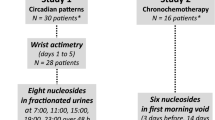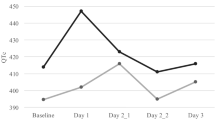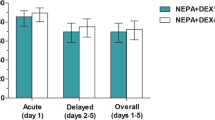Abstract
The relation between pretreatment night-time urinary catecholamine excretion and chemotherapy-induced nausea and vomiting was studied. The first cohort included 17 women and three men with various cancer forms receiving low or moderately emetogenic chemotherapy. The second cohort included 42 women receiving cisplatinum (50 mg m-2) for ovarian cancer and ondansetron as an antiemetic (8 mg i.v. x 3 at chemotherapy and 8 mg p.o. x 3 for 5 days). Relatively higher noradrenaline, but not adrenaline, excretion was associated with an increased intensity of delayed nausea following treatment. Vomiting was not consistently related to the excretion of either catecholamine. The results indicate that noradrenaline modulates delayed nausea resulting from chemotherapy.
This is a preview of subscription content, access via your institution
Access options
Subscribe to this journal
Receive 24 print issues and online access
$259.00 per year
only $10.79 per issue
Buy this article
- Purchase on Springer Link
- Instant access to full article PDF
Prices may be subject to local taxes which are calculated during checkout
Similar content being viewed by others
Author information
Authors and Affiliations
Rights and permissions
About this article
Cite this article
Fredrikson, M., Hursti, T., Steineck, G. et al. Delayed chemotherapy-induced nausea is augmented by high levels of endogenous noradrenaline. Br J Cancer 70, 642–645 (1994). https://doi.org/10.1038/bjc.1994.364
Issue Date:
DOI: https://doi.org/10.1038/bjc.1994.364
This article is cited by
-
Nausea and emesis: still an unsolved problem in cancer patients?
Supportive Care in Cancer (2002)
-
New perspectives in antiemetic treatment
Supportive Care in Cancer (1996)



